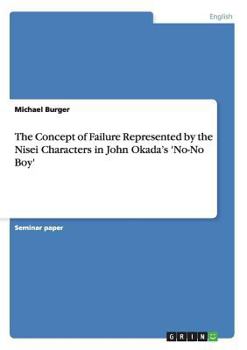The Concept of Failure Represented by the Nisei Characters in John Okada's 'No-No Boy'
Seminar paper from the year 2009 in the subject English Language and Literature Studies - Literature, grade: 1,3, University of Augsburg (New English Literatures and Cultural Studies), course: Japanese Canadian and Japanese American Literature, language: English, abstract: A proverb says: "War does not determine who is right, just who is left". Left, that is naturally the veterans who managed not to get killed in battle and thus survived their mission. But left, that is also the ones who refused fighting in a war for their country, for whatever the reason. War and its aftermaths clearly do not take a decision on which of the two behaviors is right. It just leaves the involved people opposing each other contrarily - like left and right. In John Okada's novel No-No Boy, almost all of its characters are immediately confronted with the previously mentioned discord. Set in the Seattle of 1945, No-No Boy deals with the outer and inner conflicts of a young Japanese American, named Ichiro, who refused the draft by a government, which in his eyes deprived him of his identity as an American. The narration starts with its central character, Ichiro, who had just arrived at a bus station in Seattle and now sees himself confronted with a drastically changed and diverse Japanese American community. By telling the story from Ichiro's perspective, Okada thereby convinces his audience with an authentic depiction of "a quest for self-identity under extreme circumstances" (Huang, 2006: 152) in this fragmented and torn segment of society. Like his protagonist, Okada himself was an American-born son of Japanese immigrants, a so-called Nisei, and therefore also got evacuated from his hometown Seattle during the war years. When the Second World War broke out in 1939, Okada was in his mid-twenties and, unlike Ichiro in the novel, volunteered in the US Air Force, only to get discharged again directly after the war, in 1946 (see Huang, 2006: 152). Okada therefore can be rated a prime source f
Format:Paperback
Language:English
ISBN:3640512383
ISBN13:9783640512386
Release Date:January 2010
Publisher:Grin Verlag
Length:36 Pages
Weight:0.13 lbs.
Dimensions:0.1" x 5.8" x 8.3"
Customer Reviews
0 rating





